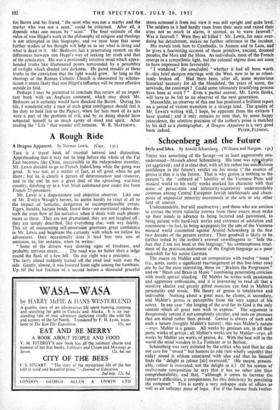A. Rough Ride
A Dragon Apparent. By Norman Lewis. (Cape. Iss.) THIS is a • travel book of unusual interest and distinction. Apprehending that it may not be long before the whole of the Far East becomes, like China, inaccessible to the independent traveller, Mr. Lewis decided to go to French Indo-China while the going was good. It was not, as a matter of fact, at all good when he got there ; but he is clearly a person of determination and resource, and in the end he saw a great deal of the sprawling, war-torn country, finishing up in a Viet Minh command-post under fire from French 25-pounders.
Mr. Lewis is a dispassionate and objective observer. Likb one of Mr. Evelyn Waugh's heroes, he seems hardly to react at all to the impact of fantastic, dangerous or incomprehensible events. Tigers, bandits, hairpin bends, forest Ares—no emotional eddies dis- turb the even flow of his narrative when it deals with such pheno- . mean as these. They are not dramatised, they are not laughed off ; they are simply described, like everything else, with wry fidelity. This air of unassuming self-possession 'generates great confidence in Mr. Lewis and heightens the curiosity with which we-follow his adventures. Only occasionally does it lead him into sins of omission, as, for instance, when he writes : " Some of the drivers were showing signs of tiredness, and probably nervous strain. . . . The road was no better than a ledge round the flank of a low hill. On our right was a. precipice. . . . The lorry ahead suddenly turned off the road and went over the side. Gently, almost, it was lowered from sight among the bamboos. Up till the last fraction of a second before a thousand graceful
stems screened it froin our view it was still upright and quite level. The soldiers in it had hardly risen from their seats and raised their arms not so much in alarm, it seemed, as to wave farewell." Was it farewell ? Were they all killed ? Mr. Lewis, for once over-.. doing his detachment, makes no further reference to the incident.
His travels took him to Cambodia, to Annam and to Laos, and he gives a fascinating account of those primitive, ancient, doomed peoples, the Mois and the Meos. As individuals, most of the French emerge in a sympathetic light, but the colonial regime does not seem to have impressed him favourably.
" I wondered " (he concludes) " whether it had all been worth it—this brief shotgun marriage with the West, now to be so relent lessly broken off. Had there been, after all, some mysterious historical necessity for all the bloodshed, the years of scorn, the servitude, the,contempt ? Could some ultimately fructifying process have been at work ? " Even a partial answer, Mr. Lewis thinks, will have to be left to an observer of the next generation.
Meanwhile, an observer of this one has produced a brilliant report on a period of violent transition in a strange land. The quality of Mr. Lewis's writing will, I hope, be apparent from the extracts I have quoted • and it 'only remains to note that, by some happy coincidence, the selective precision of the author's prose is matched by his skill as a photographer. A Dragon Apparent is a very good


































 Previous page
Previous page